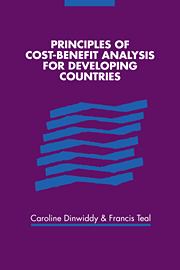Book contents
- Frontmatter
- Contents
- List of figures
- List of economic models and tables
- Preface
- Part I: Introduction to welfare economics
- 1 Measuring changes in economic welfare: consumer and producer surplus
- 2 Consumers and producers: some basic theory
- 3 Welfare change in general equilibrium
- 4 Equity and efficiency
- Part II: Project and policy appraisal in developing countries
- Part III: Missing markets
- Retrospect
- Bibliography
- Index
4 - Equity and efficiency
Published online by Cambridge University Press: 22 October 2009
- Frontmatter
- Contents
- List of figures
- List of economic models and tables
- Preface
- Part I: Introduction to welfare economics
- 1 Measuring changes in economic welfare: consumer and producer surplus
- 2 Consumers and producers: some basic theory
- 3 Welfare change in general equilibrium
- 4 Equity and efficiency
- Part II: Project and policy appraisal in developing countries
- Part III: Missing markets
- Retrospect
- Bibliography
- Index
Summary
Even if proposed policies or projects can be shown, along the lines discussed in chapter 3, to lead to an overall increase in social welfare, it is almost certain that when the policies are implemented the gains will not be evenly distributed. It is likely that some households will gain more than others and that some will actually find themselves worse off. There are many studies of the effects of the new technologies known collectively as the ‘Green Revolution’ which discuss the uneven effects on the distribution of income in India and Pakistan. (See, for example, Lipton, 1989.) Projects to increase the production of cash crops in West Africa were for many years argued, for example by Boserup (1970), to benefit male members of the household at the expense of female members who were primarily responsible for subsistence food crop production. Taxes, subsidies and commodity stabilisation policies typically affect consumers and producers in opposite ways. Predicting the distribution effects of government policies is one of the most difficult problems in cost-benefit analysis. State action may have the intended effect: Little, Mazumdar and Page (1987) concluded that protection against advanced factory production had served to encourage small-scale, labour-intensive soap manufacturing in India and considered that there were ‘good distributive reasons for retaining an excise tax on superior soap’ (Little, Mazumdar and Page, p.50).
- Type
- Chapter
- Information
- Publisher: Cambridge University PressPrint publication year: 1996



